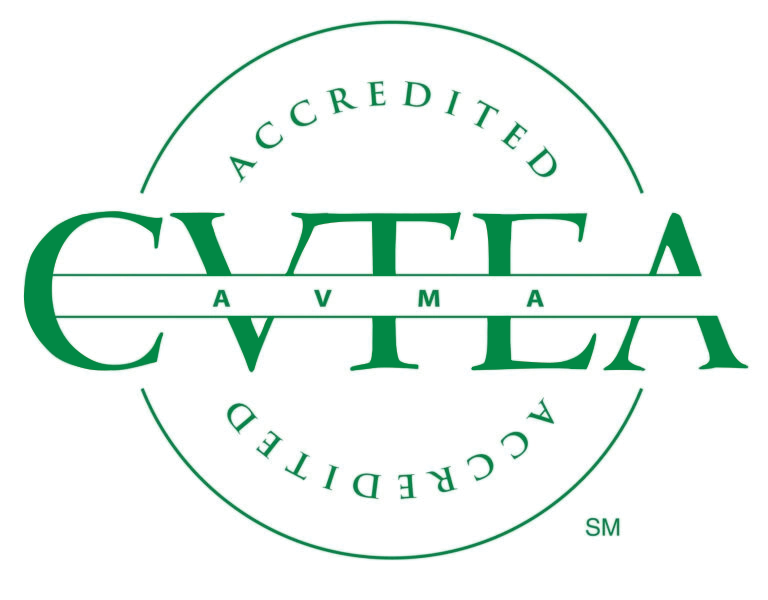Discover a career where your love for animals makes a difference in your community.
Do you have a passion for caring for animals? At Rockford Career College, our Veterinary Technician Associate Degree program helps you turn that passion into a profession. Through a career-focused curriculum and hands-on training, you’ll build the skills needed to support veterinarians in private practices, shelters, zoos, and research facilities.
From assisting during surgery to educating pet owners, veterinary technicians are essential members of the animal care team. With flexible hybrid learning, experienced instructors, and personalized support, Rockford prepares you to step into this in-demand field with confidence.
DURATION: 24 Months
CREDENTIALS: Associate of Applied Science (A.A.S.)
FORMAT: Hybrid On-Campus, Online, with Clinical Externships
CREDITS: 114.5 quarter credit hours
Hands-On Vet Tech Training That Gets You Career-Ready
Our curriculum is designed to prepare you for real-life animal healthcare settings and the Veterinary Technician National Exam (VTNE).
What You’ll Learn:
Where a Vet Tech Degree Can Take You
Veterinary technicians are an essential part of animal healthcare, providing critical support during exams, surgeries, lab testing, and daily animal care. They play a hands-on role in ensuring animals receive the best medical attention possible.
Graduates of the Rockford Vet Tech program may pursue careers such as:
Flexible. Focused. Built for real life.
Most programs are blended, combining scheduled on-campus classes with online coursework. This gives you the hands-on training you need — plus the flexibility to complete assignments at home.
You’ll typically take two classes every five weeks and should plan for 12–15 hours per week of homework and studying. Instructors also offer live virtual office hours for extra support.
Whether you’re working, parenting, or have other commitments — we’ll help make school work for you.
Q: What’s the difference between a vet tech and a veterinary assistant?
Veterinary technicians receive more advanced clinical education and training than veterinary assistants. At Rockford, vet tech students learn surgical prep, lab diagnostics, anesthesia, and patient care—skills that prepare them to directly support veterinarians in both general and emergency settings.
Q: What are the admissions requirements for the Vet Tech program?
To enroll, students must meet Rockford Career College’s general admissions criteria, submit a brief essay on their interest in veterinary technology, and provide proof of rabies vaccination.
Q: Is this program available online?
Not entirely. The Veterinary Technician program at Rockford is delivered in a hybrid format. While some general education courses are online, labs and externships take place on campus or at veterinary sites.
Q: How often will I be in the lab or working with animals?
Students regularly participate in labs and clinical courses throughout the program. You’ll have frequent hands-on opportunities with animals, especially during your externship.
Q: What kinds of animals will I work with during the program?
You’ll gain hands-on experience with dogs, cats, exotic pets, livestock, and laboratory animals, giving you a well-rounded foundation for various veterinary environments.
Next Session Starts: February 9, 2026
According to the American Pet Products Association, pet owners are expected to spend over $143 billion on their pets this year.1
According to the Bureau of Labor Statistics, employment of Veterinary Assistants is projected to grow 20% in Illinois from 2021 to 2031.2
Questions about our Rockford campus? Let’s connecta dn talk about your future.
Get In touch
1 https://www.americanpetproducts.org/press_industrytrends.asp, retrieved on 4/10/2023.
2 https://www.onetonline.org/link/localtrends/29-2056.00?st=IL, retrieved 5/31/2023.
Why Students Choose Rockford for Vet Tech Training:
According to the American Pet Products Association, pet owners are expected to spend over $143 billion on their pets this year.1
According to the Bureau of Labor Statistics, employment of Veterinary Assistants is projected to grow 20% in Illinois from 2021 to 2031.2

The Veterinary Technician AAS program is accredited by the AVMA CVTEA as a program for educating veterinary technicians. Graduates are prepared to take the Veterinary Technician National Exam (VTNE).

Our school teaches Fear Free education.
www.fearfreepets.com

Worried about how to afford veterinary technician training? Let us help! Our friendly financial aid team is here to help you explore funding, scholarships, and grants to help make Rockford fit your budget.



Rockford Career College
(A Branch Campus of Stautzenberger College-Maumee)
1130 S Alpine Rd #100,
Rockford, IL 61108
Phone: (815) 965-8616
or (888) 680-6682
Stay connected with updates on how Rockford Works!